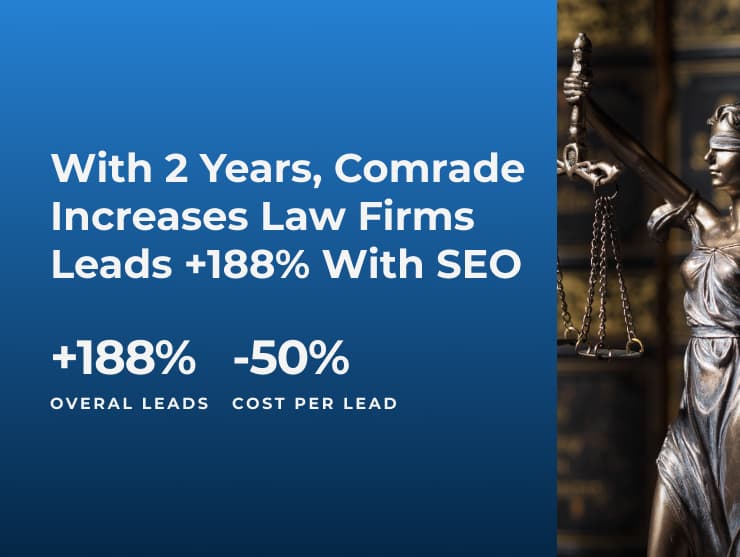Nowadays online legal services demands a unique edge to grow, and link building emerges as a pivotal strategy. It transcends mere backlink acquisition, evolving into a potent maneuver capable of catapulting your law firm’s digital standing, establishing credibility, and broadening your clientele. Strategically securing high-quality links from reputable sources becomes a game-changer, boosting your search engine rankings, showcasing expertise, and attracting a more discerning clientele. Quality outweighs quantity in this dynamic arena.
Embark on a comprehensive journey into the realm of link-building tailored for lawyers. This strategy guide equips you with tools, techniques, and insider insights to craft a distinctive link-building approach, setting your firm apart. Prepare to enhance your online presence and propel your law practice to unprecedented heights through the strategic art of link building.
Part of Our SEO Guide for Law Firms
Explore each part of our complete guide to mastering SEO for law firms:
What Is Link Building?
Link building is a strategic practice in search engine optimization (SEO) that involves acquiring hyperlinks from other websites to your own law firm’s website. These external links act as votes of confidence, signaling to search engines that your website is reputable, authoritative, and relevant.
Link building plays a crucial role in improving your website’s visibility in search engine results and driving organic traffic. By securing high-quality and relevant backlinks from reputable websites, you can enhance your online presence, increase your website’s authority, and attract more potential clients to your legal services.
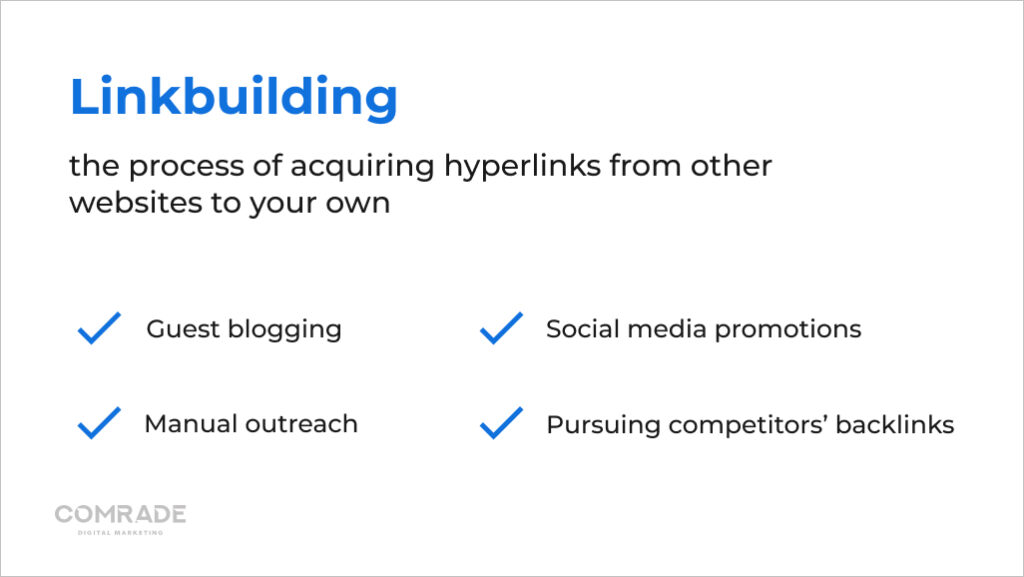
However, it’s important to approach link building ethically and focus on acquiring natural and relevant links through genuine relationships, content creation, and valuable contributions to the online legal community.
Ready to supercharge your SEO strategy? Discover the critical role of link building and gain valuable insights for success in our latest article.
How Does Link Building for Law Firms Work?
Link building for law firms involves acquiring hyperlinks from other websites to your law firm’s website. These hyperlinks function as “badges of trust,” signaling to search engines the reliability and expertise of your online platform. As an example, let’s say a reputable legal blog publishes an article related to your practice area and includes a hyperlink to your law firm’s website within the content. When search engines crawl the blog and find the link, they view it as a positive endorsement of your firm’s expertise. This, in turn, can improve your website’s search engine rankings and visibility.
The process of link building involves various strategies, such as creating high-quality content that naturally attracts links, reaching out to other relevant websites for collaboration or guest posting opportunities, and utilizing online directories and legal associations to secure backlinks. It’s essential to focus on acquiring links from authoritative and relevant websites within the legal industry. Furthermore, nurturing a diverse and organic link profile is paramount, since search engines highly appreciate a blend of varied link types for optimal ranking.
Through the strategic application of link-building techniques, legal practices have the opportunity to elevate their digital footprint, amplify web traffic, and ultimately magnetize a greater pool of prospective clients.
19 Link-Building Strategies for Lawyers
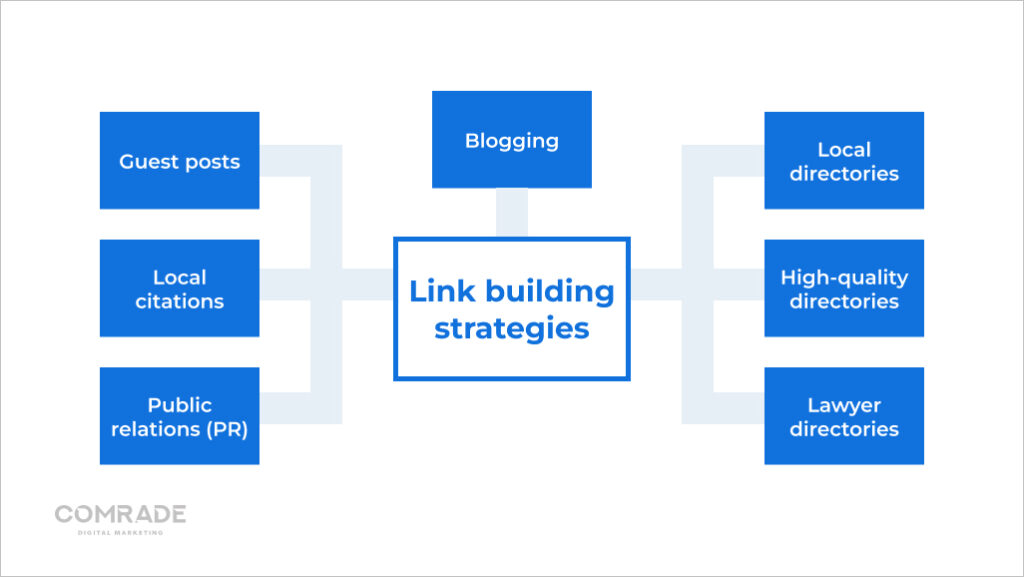
1. Craft Exceptional Legal Content
As we’ve explored previously, harnessing the power of blogging can significantly amplify your website’s visibility. A well-crafted blog exemplifies your law firm’s authoritative stance in the legal arena.
The distinct content you generate often becomes a touchstone for others when making their arguments. These references frequently include organic links to your site, which Google considers in evaluating your search result rankings.
Don’t miss out on the key to attracting more clients online in 2024. Get started with improving your law firm’s website content today.
2. Guest Posts
Embarking on your content journey opens doors to guest posting ventures across diverse online platforms, including blogs, web publications, and relevant websites.
Our suggestion is to hold off on venturing into third-party guest posts until you’ve built a few months of blogging on your own site. This span affords you the opportunity to hone your writing style before venturing into external platforms.
A guest post offers a dual advantage. It grants you access to their readership and secures a prominent byline featuring your name, a brief overview, and a link to your website.
This byline not only cultivates positive backlinks for search traffic but also forges connections with readers who engage with your piece.
Amid the multitude of guest post prospects, discerning selection is key. Opt for websites within a similar niche and boasting higher domain authority; remember, not all inbound links are created equal.
Consider exploring these potential platforms for your guest contributions:
- Above the Law
- The Legal Intelligencer (A Division of Law.Com)
- Law and Crime
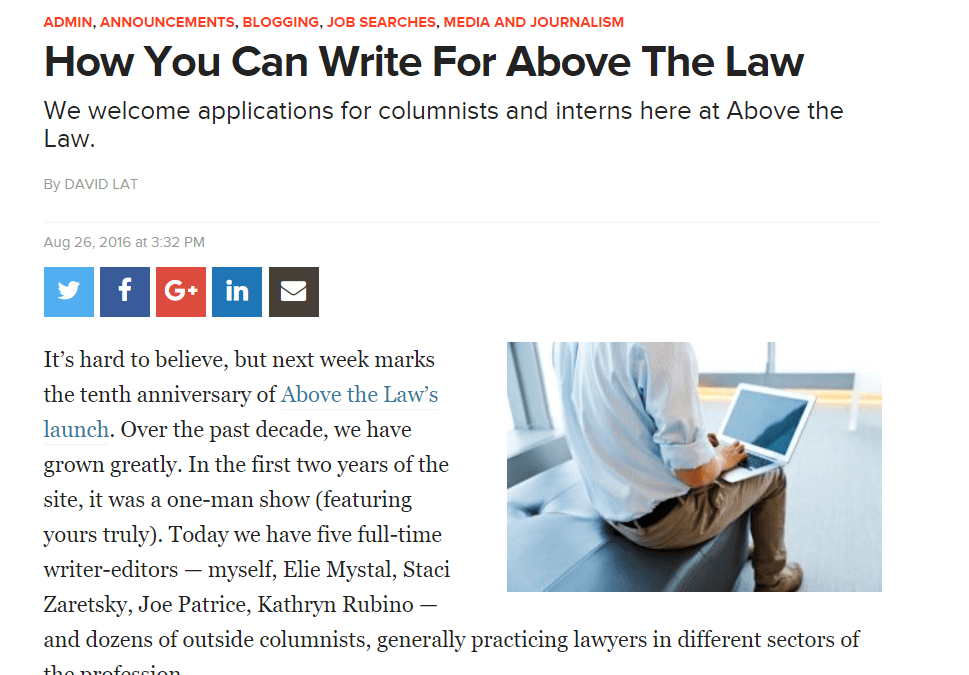
3. Embrace Online Directories Wisely
In yesteryears, directories were the golden ticket to soaring search rankings. Yet, the era witnessed a flood of black-hat link tactics. Today, tread cautiously while leveraging free or paid directories for backlinks.
Exercise prudence by featuring your site on esteemed legal directories solely. Mishandling this might backfire on your link-building pursuits. Explore top-tier directories like:
Strategize wisely to harness the power of directories without jeopardizing your SEO endeavors.
Ready to boost your firm’s visibility in 2024? Dive into our guide on leveraging online directories for law firms.
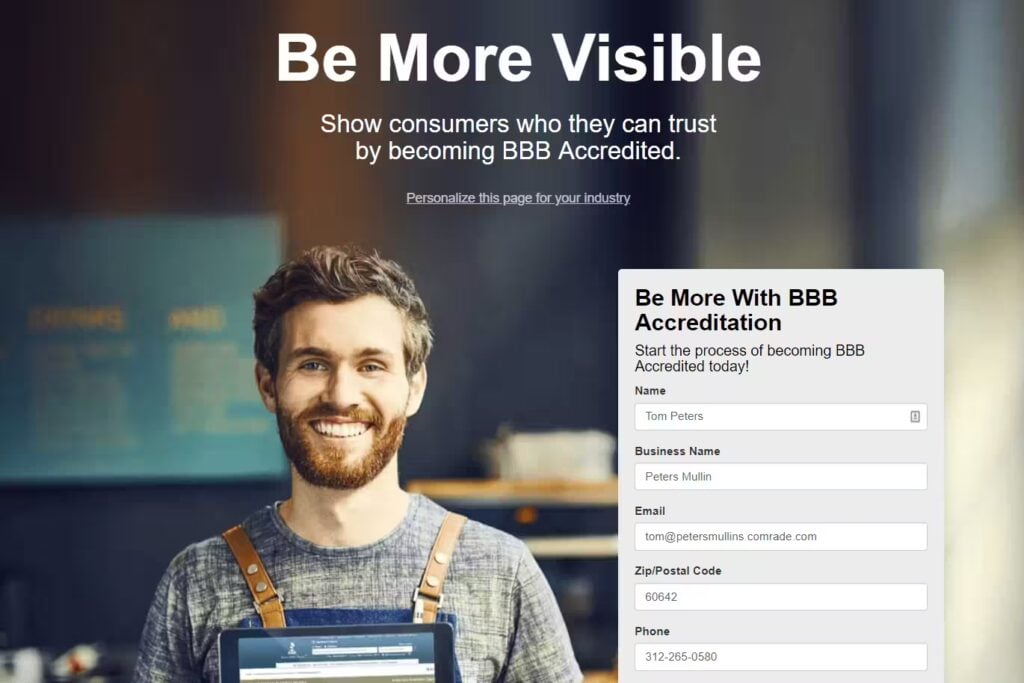
4. Claim an Account in Lawyer Directories
After your inclusion in mainstream business directories, don’t forget to secure a spot in specialized legal directories. Attorney directories offer a range of unique advantages.
One of these perks is their link-building potential. Given the dynamic landscape of these platforms, it’s crucial to adopt a tailored approach to align with your link-building objectives. Here are prime examples of attorney and practice-focused directories that can amplify your digital footprint:
- Avvo: Elevate your visibility within the legal community.
- The Personal Injury Directory: Catering specifically to personal injury cases.
- Lawyers.Com: Widen your reach and enhance credibility.
- ExpertLaw.Com: Showcase your expertise and gain trust in your practice area.
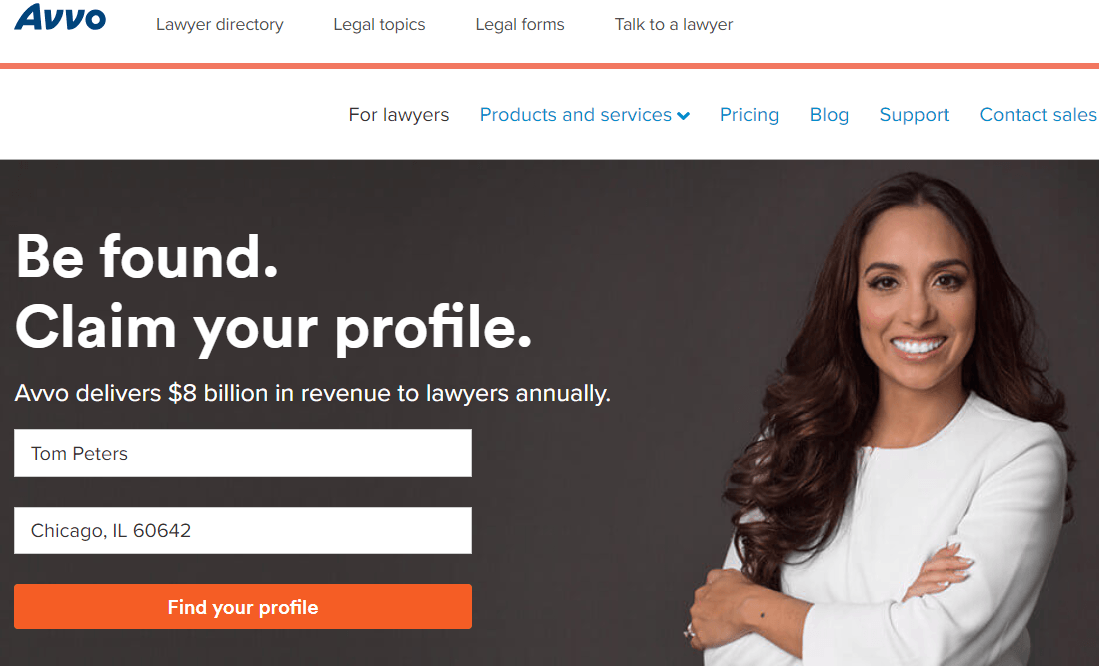
5. Embrace the Power of Neighborhood Listings
Diversify beyond legal directories. Embrace local directories for broader exposure. Key local platforms include:
- Yelp
- Google Business page
- Bing Business Page
- Angi
- Merchant Circle
- Foursquare
- Manta
- City Squares
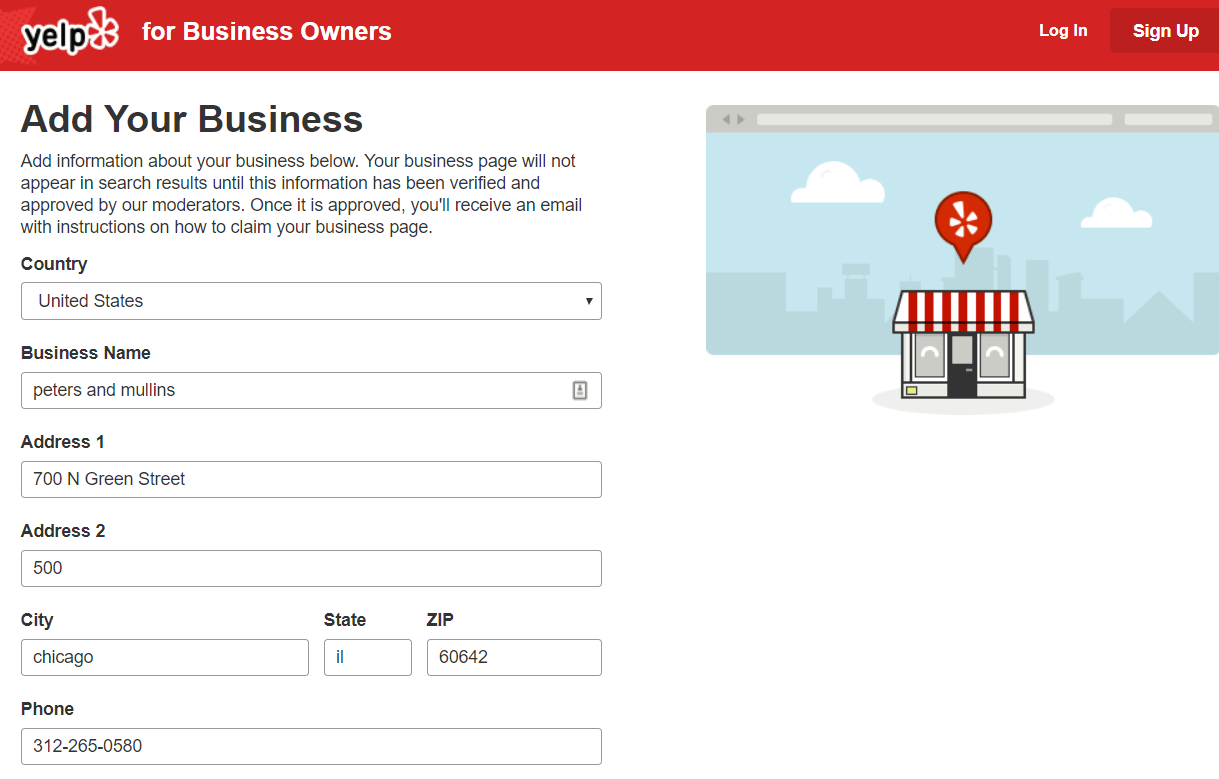
6. Seek Local Citations
Incorporating local citations holds immense value for your law practice. A unique touch is that citations substitute a web link with your Company Name. Google’s AI aligns this name with your Google My Business Page, acting as an authority signal akin to premium backlinks for your site’s credibility.
However, the magic lies in the precise synchronization of Name, Address, and Phone Number (NAP) across third-party platforms with your Google details. The efficacy of this can be monitored through tools like Moz Local, ensuring consistent NAP representation.
Local SEO for law firms is the key to connecting with potential clients who are actively searching for legal services in your area.

7. Fusing Public Relations (PR) for an SEO Boost
Blending PR seamlessly with attorney-focused SEO holds immense potential. As you engage in interviews with news entities, their web-based story sharing often entails linking to your website, especially when citing your expertise. A stellar jump-off point is Help A Reporter Out (HARO).

The beauty lies in its versatility across bloggers, podcasters, and reputable domains, encompassing news hubs and legal publications alike. Given your legal prowess, reporters seek your insights on varied legal fronts. Seek out prime news platforms to resonate with potential clientele and amplify your site’s link profile.
What Is the Difference Between Link Building and PR?
Link building is about impressing Google to achieve a higher position on search engine rankings, whereas PR is about impressing consumers. Traditionally, link-building seeks opportunities to gain links in places where your target audience is online, i.e., forums, local citations, free directories, industry blogs, and publications.
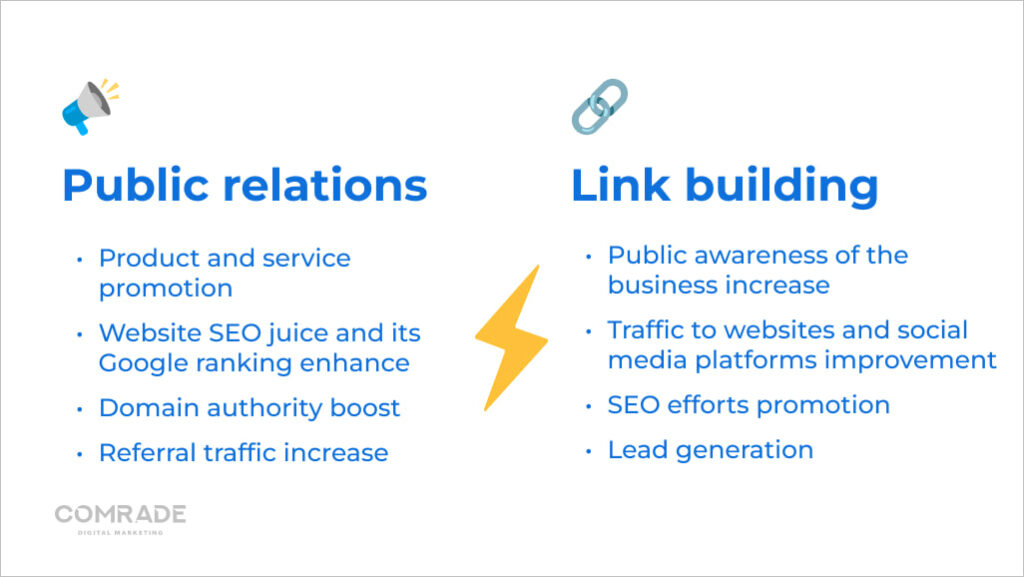
PR shapes perception and builds trust. Link building boosts SEO for lawyers and improves visibility. Both are crucial for success
Although these websites might not have high domain authority, they are relevant to your brand, which makes them a powerful element for supporting your organic strategy.
On the other hand, digital PR focuses on getting links on top-tier websites like newspapers, magazines, and so on so that people talk about your brand and in turn improve its ranking positions. These top-tier sites have a better trust flow and help achieve a higher SEO with the ultimate aim of gaining brand exposure.
Discover how SEO services for lawyers can transform your client acquisition.
8. Request Niche Edits
One effective strategy for link building in the legal industry is to request niche edits. Niche edits, also known as contextual link placements, involve finding relevant and authoritative websites within the legal niche and requesting to have a link to your law firm’s website added within existing content. This strategy can provide valuable backlinks that boost your website’s authority and visibility in search engine rankings.
Embark on your niche edits journey by pinpointing top-tier legal blogs, publications, or resource sites that mirror your practice field or audience. Personalize your outreach email to spotlight your law firm’s enrichment for their readers. Suggest a contextual link inclusion in a pertinent article or page.
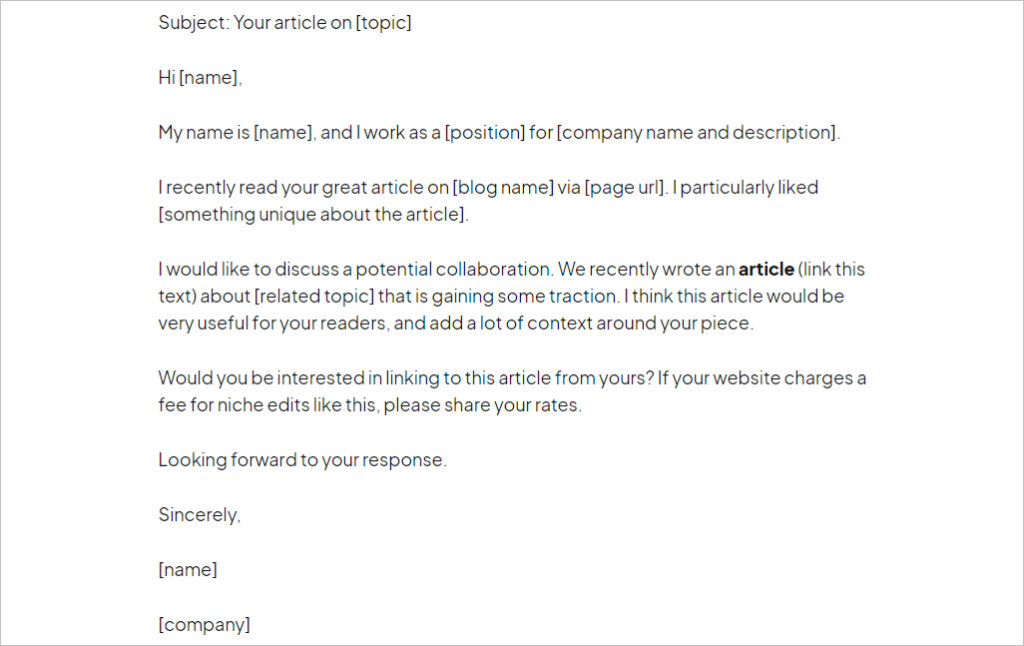
Remember, when requesting niche edits, it’s essential to approach website owners professionally, provide compelling reasons for link inclusion, and focus on building mutually beneficial relationships.
9. Create Statistics and FAQ pages
To bolster link-building within the legal domain, consider fashioning distinct sections on your law firm’s online platform featuring insightful statistics and addressing FAQs. Such pages emerge as trustworthy references, luring organic backlinks from diverse sources including news sites, legal catalogs, and sector publications.

To implement this strategy, conduct thorough research to gather relevant and up-to-date statistics related to your practice area. Present this data in a visually appealing and easy-to-understand format on a dedicated statistics page. Additionally, create an FAQ page that addresses common legal questions and provides informative answers.

By offering valuable and accurate information through statistics and FAQ pages, you increase the chances of attracting natural backlinks from reputable sources looking to reference and cite your data. Remember to promote these pages through outreach efforts to relevant websites, encouraging them to link to your valuable resources.
10. Establish Your Authority as an Invaluable External Source
Distinguishing yourself as a coveted legal information hub opens doors to strategic link-building. By generously sharing your acumen and insights, you magnetize organic backlinks from respected platforms that seek to cite your expertise.
Execute this tactic by crafting a specialized “Insights” or “References” section within your law firm’s website. Populate it with premium content like whitepapers, tutorials, case analyses, or educational pieces tied to your niche. Initiate connections with pertinent legal journals, sector blogs, or news hubs and proffer your content for potential incorporation in their editorial or knowledge dissemination.

By positioning yourself as a reliable and knowledgeable source, other websites in the legal industry are more likely to reference your content and provide backlinks to your law firm’s website. Remember to actively promote your resources through targeted outreach, ensuring that your valuable content reaches the right audience and generates quality backlinks.
Stay ahead of the competition with cutting-edge digital marketing for law firms. Check our expert insights.
11. Do Interviews and Podcasts
An effective strategy for link-building in the legal industry is to participate in interviews and podcasts. By sharing your legal expertise and insights with relevant interviewers and podcast hosts, you can gain exposure and earn valuable backlinks to your law firm’s website.
To implement this strategy, identify industry-specific podcasts, legal talk shows, or interview platforms that cater to your target audience. Reach out to the hosts or organizers expressing your interest in being a guest. Offer unique and valuable topics that you can discuss during the interview, showcasing your expertise and providing valuable insights to the audience.
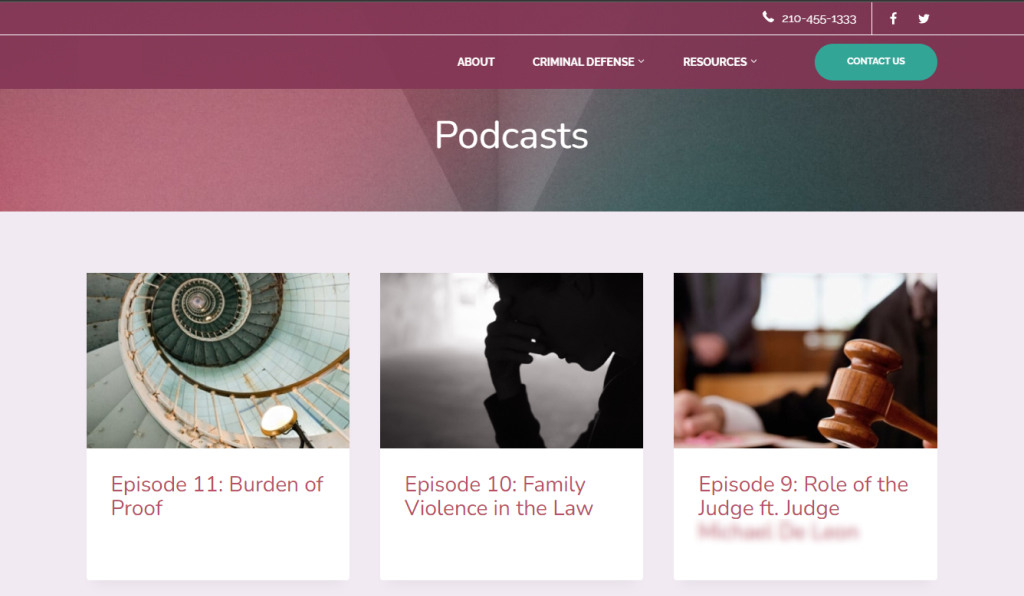
By participating in interviews and podcasts, you can position yourself as an authority in your legal field, attracting natural backlinks from the podcast or interview platforms. Additionally, promote the interviews on your law firm’s website and social media channels to further maximize their reach and visibility.
12. Share Your Expertise with Journalists at Haro
One effective strategy for link building in the legal industry is to share your expertise with journalists through Help a Reporter Out (HARO). HARO connects journalists and experts, providing an opportunity for legal professionals to showcase their knowledge and gain backlinks from reputable news sources.
To implement this strategy, sign up as an expert source on HARO and monitor daily email notifications for relevant journalist queries. When you come across a query that aligns with your expertise, respond promptly with valuable insights, advice, or quotes. Include your law firm’s website and contact information in your response.
Through a persistent commitment to delivering insightful replies to journalist queries via HARO, you amplify the likelihood of your inclusion or citation in news pieces. This yields premium backlinks from respected sources, emphasizing the significance of engaging promptly and professionally to cultivate journalist relationships and optimize your link-building prospects.
13. Create Graphics and Other Quotable Resources
Forge a remarkable link-building approach by crafting captivating visual elements and distinctive quotable assets. These shareable resources encompass infographics, data visualizations, quote cards, or insightful legal guides, resonating effectively with diverse websites and publications.
To execute this strategy, pinpoint pivotal legal themes or statistics pertinent to your practice domain. Conceptualize compelling visuals or quote cards spotlighting crucial insights. Seamlessly weave your law firm’s branding and website into these resources, reinforcing your distinct identity.
By creating graphics and quotable resources, you increase the chances of other websites and publications sharing your content and providing backlinks to your law firm’s website. Promote these resources through your own website, social media channels, and outreach efforts to maximize their visibility and link-building potential.
Want to make a lasting impression online? Explore how graphic design can amplify your digital marketing efforts in our informative article.
14. Write Up Case Studies & Testimonials
A powerful strategy for link building in the legal industry is to create compelling case studies and testimonials. These pieces of content provide an opportunity to showcase successful outcomes and demonstrate your law firm’s expertise and credibility.
To implement this strategy, identify notable cases or clients with positive experiences and outcomes. Write detailed case studies that highlight the challenges faced, the legal strategies employed, and the favorable results achieved. Additionally, gather testimonials from satisfied clients and feature them on your website.
Constructing case studies and testimonials goes beyond informing potential clients; it beckons interest from assorted sources seeking to cite or link back to your accomplishments. Disseminate these triumphant narratives through your law firm’s website, social media avenues, and outreach initiatives to harness their ultimate potential for link-building.
Comrade Digital Marketing Agency can help you with the above if you’re unsure how to go about it. Schedule a free consultation.
15. Engage in Broken Link Building Strategy
Within the legal sector’s link-building landscape, a dynamic technique emerges: the art of broken link building. Identify non-functional links on external web domains and initiate conversations with site proprietors. Advocate the infusion of relevant, high-value content from your law firm’s website as an optimal replacement.
To implement this strategy, start by identifying authoritative legal websites or resources within your niche. Use tools like Check My Links or Broken Link Checker to find broken links on those websites. Once you find broken links, create or identify relevant content on your website that can serve as a replacement.
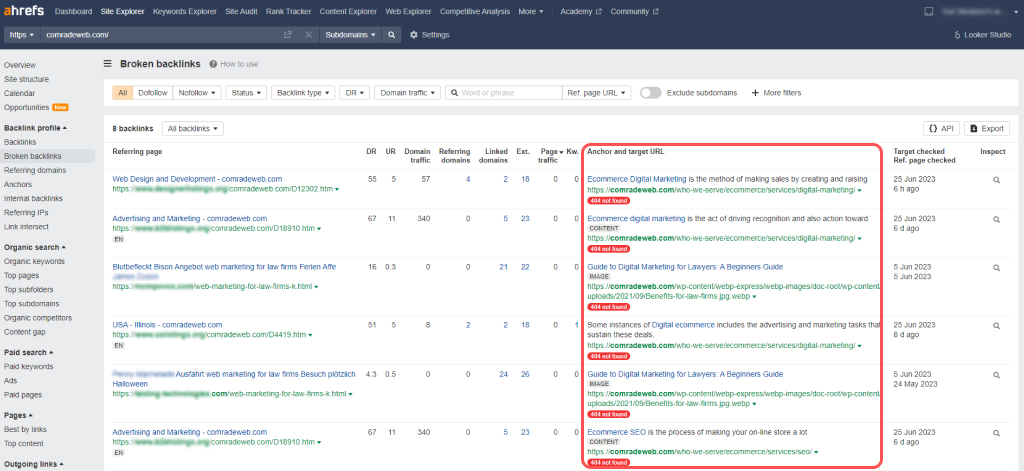
Dive into broken link building as a win-win tactic. Aid website owners in remedying broken links, enhancing user experiences, and securing valuable backlinks for your law firm’s site. Approach proprietors with professionalism, extend pertinent content replacements, and underscore the mutual advantages of link rectification.
16. Write Press Releases
A valuable strategy for link-building in the legal industry is to write and distribute press releases. Press releases allow you to share newsworthy updates about your law firm, such as notable case wins, legal insights, community involvement, or any significant achievements.
To implement this strategy, identify newsworthy topics or events within your law firm and craft well-written press releases. Include relevant keywords and key phrases to optimize for search engines. Share these press releases across a range of media channels, legal journals, and specialized industry websites.
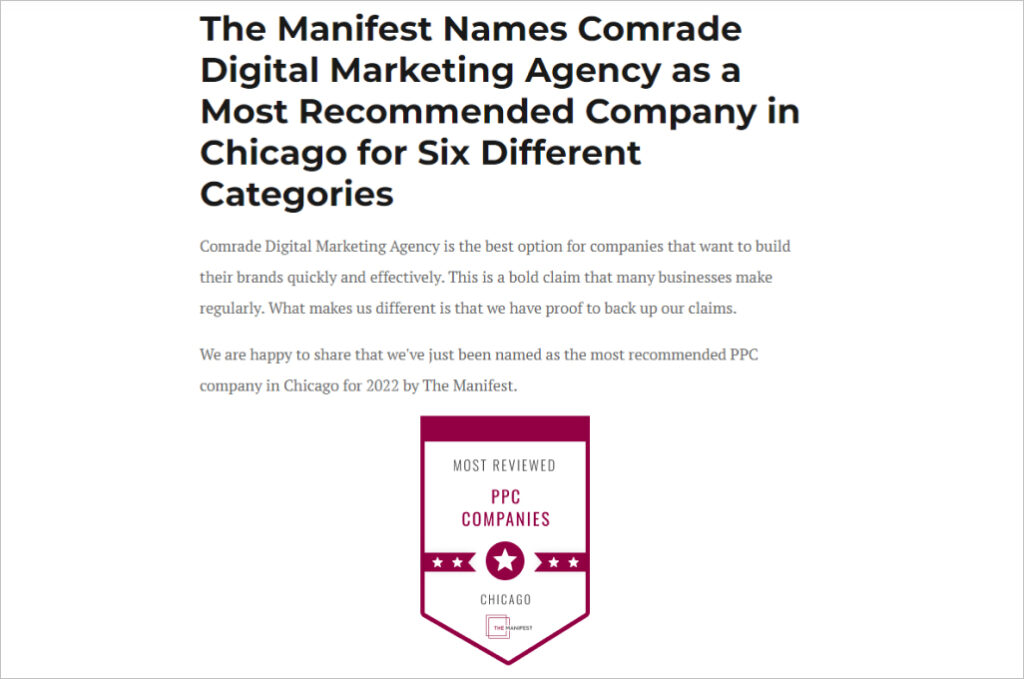
By writing and distributing press releases, you increase the chances of earning backlinks from reputable news sources and gaining exposure for your law firm. Remember to include a link to your law firm’s website within the press release to drive traffic and enhance link-building opportunities.
17. Build a Social Media Profile
Cultivating a robust social media marketing for lawyers strategy involves establishing a strong digital footprint in the legal sector. Develop and maintain an interactive online persona for your law firm, enabling you to connect with your audience while accumulating organic backlinks through the dissemination of valuable content.
Execute this approach by crafting engaging profiles on platforms that seamlessly mesh with your intended demographic. Whether it’s LinkedIn, Twitter, Facebook, or Instagram, tailor your profiles with pertinent keywords, a captivating narrative, and a direct link to your firm’s official website.
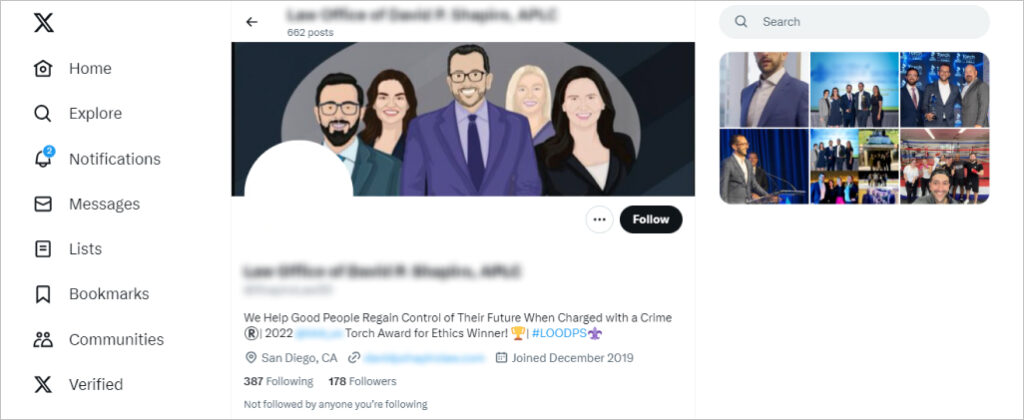
Regularly posting, actively interacting with your audience, and disseminating high-value legal insights can help establish a dedicated following and incentivize linkbacks to your legal practice’s website. Optimize the impact of your social media profiles by strategically promoting them across your website, blog, and various promotional avenues, intensifying your link-building strategy.
18. Engage in Link Reclamation
Link reclamation is a powerful strategy for link building that involves identifying and reclaiming lost or broken links to your law firm’s website. This strategy helps you regain valuable backlinks and improve your website’s overall link profile.
Embark on this tactic by utilizing tools such as Google Search Console or a backlink analysis solution. Pinpoint broken or vanished links linked to your site. Once identified, communicate with site proprietors or administrators, urging them to rectify or revise problematic URLs.
Optimize your strategy with link reclamation, reclaiming significant backlinks to amplify your law firm’s search engine standing, prominence, and authority. When reaching out to site owners, adopt a polished approach, furnish accurate URLs or updated content, and accentuate the value in reviving the misplaced or malfunctioning link.
19. Work with a Link Building Specialist
Regarding link-building endeavors, collaborating with a specialist emerges as a potent tactic. These professionals possess a profound grasp of SEO intricacies, meticulously fashioning and implementing link-building campaigns meticulously customized for your law firm’s individual demands.
To implement this strategy, research and identify reputable link-building specialists or agencies with a track record of success in the legal industry. Collaborate with them to develop a comprehensive link-building strategy that aligns with your goals and target audience.
By working with a link-building specialist, you can leverage their knowledge and connections to secure high-quality backlinks, improve your website’s visibility, and drive more targeted traffic to your law firm’s website. This strategy allows you to focus on your legal expertise while leaving the intricacies of link-building to the specialists.
Why Is Link Building Crucial for Lawyers?
Establishing a robust web of influential connections holds the key to positioning your law firm’s website as a trustworthy and invaluable asset. This strategic approach ultimately propels you to elevated search engine rankings, solidifying your online prominence. Link building involves various techniques, including guest blogging, social media promotions, manual outreach, and exploring competitors’ backlinks. However, it’s important to note that link building is a gradual process, typically taking around 11 months to reach peak traffic, according to Linkbuilder.io. Rapidly acquiring too many links can raise concerns with Google, so it’s best to gradually develop your link profile using the proven tactics we provide below.
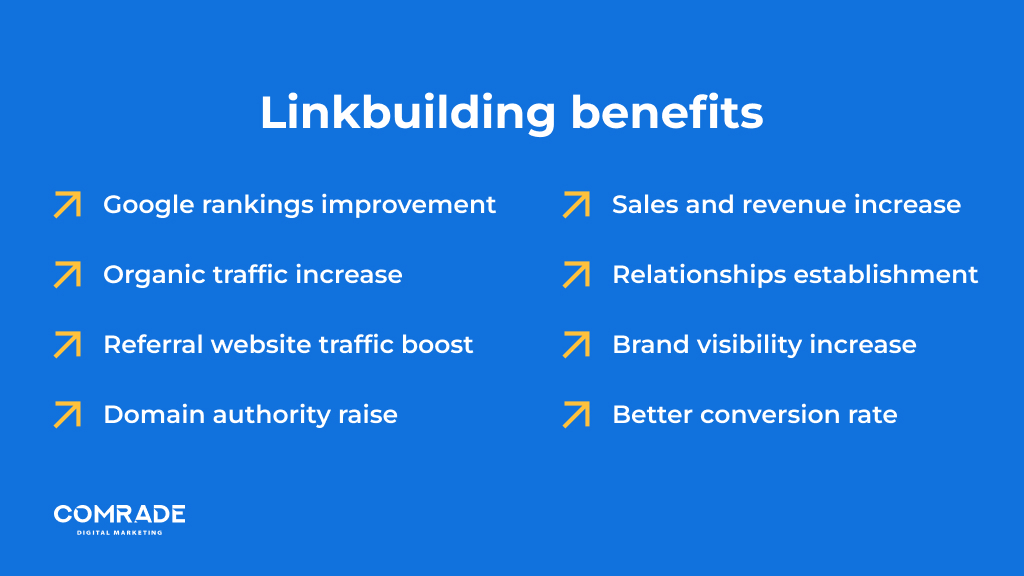
Not only does link building contribute to search engine optimization, but it also offers a multitude of benefits beyond improved rankings on search engine result pages. By implementing effective link-building strategies, you can enhance search rankings, increase organic and referral website traffic, boost domain authority, generate higher sales and revenue, forge relationships within your niche, and amplify brand visibility.
How Do You Make Link Building Safe?
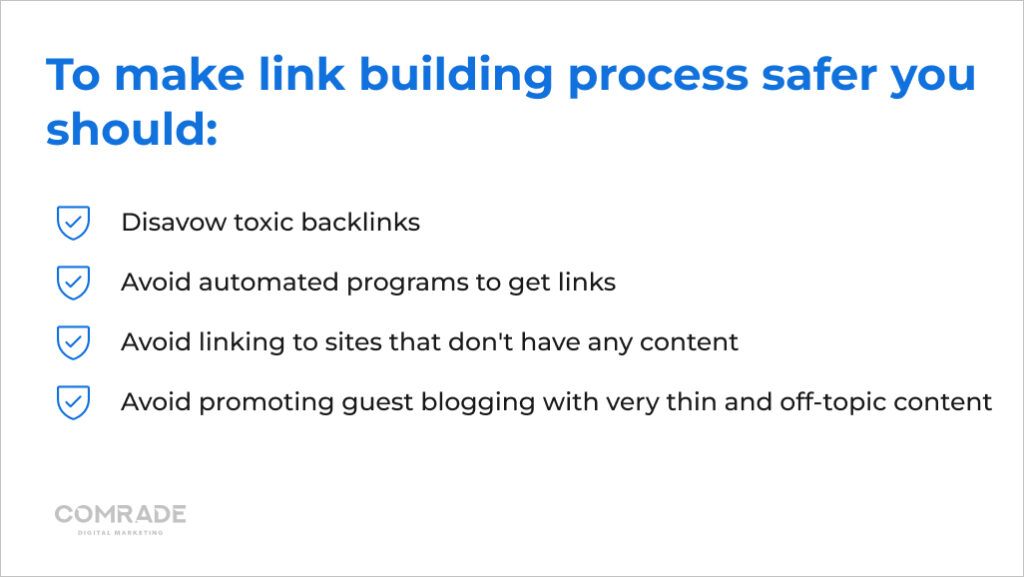
There are safe link-building steps that shield against Google penalties. Poor black hat tactics often result in backlash, from algorithmic repercussions to manual penalties. Uphold ethical practices by refraining from:
- Purchasing subpar links
- Engaging in link exchange
- Guest blogging off-topic content
- Commenting on forums solely for link placement
- Allowing irrelevant, spammy links on your law site
Remember, links should be user-centric, inviting clicks. Links devoid of this purpose don’t belong in your strategy.
Link Building for Lawyers Basics You Should Know
Distinguishing Link Attributes: Follow vs. No-Follow
In the web realm, links don different personas—either they’re follow or no-follow. However, the intriguing twist lies in the no-follow links. These enigmatic links don’t exactly play well with SEO due to Google’s inability to grasp their essence. Still, they hold the power to lead back to your digital domain, albeit without improving your search engine ranking.
Referring Domains
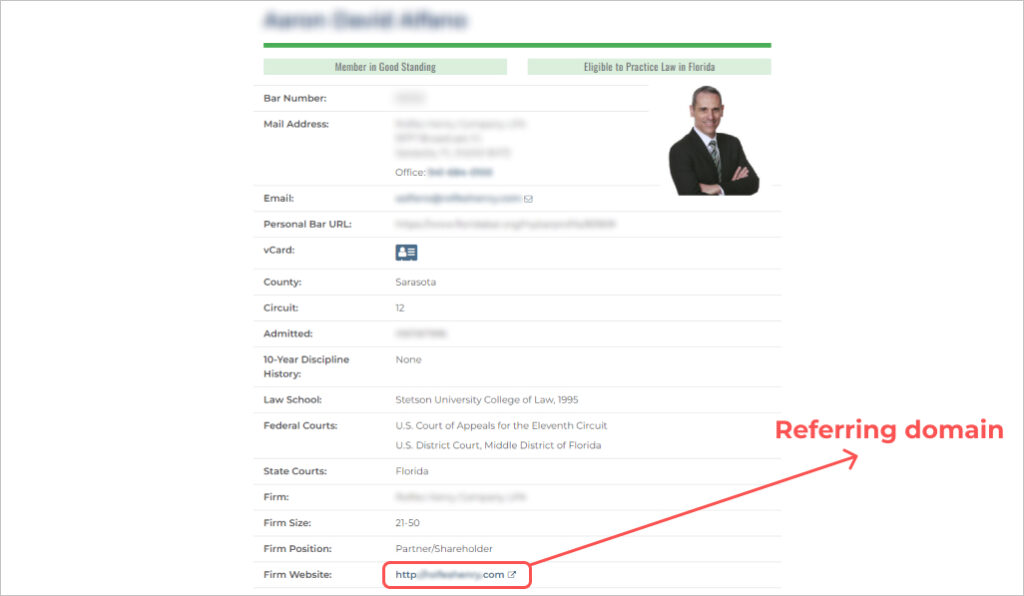
Typically, greater authority within the referring domain translates to heightened search impact. A link from a bar association is a high-authority connection that bolsters search rankings positively.
Remember, multiple links from a single domain may yield diminished value and a potentially artificial link profile. To foster a robust backlink portfolio, prioritize acquiring links from diverse, distinct domains over time.
Anchor Text
Anchor text refers to the visible text that appears as a clickable link on a webpage, rather than the actual URL it leads to. The choice of anchor text can impact search performance, particularly when it includes relevant keywords that align with the page’s intended ranking. Take, for example, a personal injury law firm.
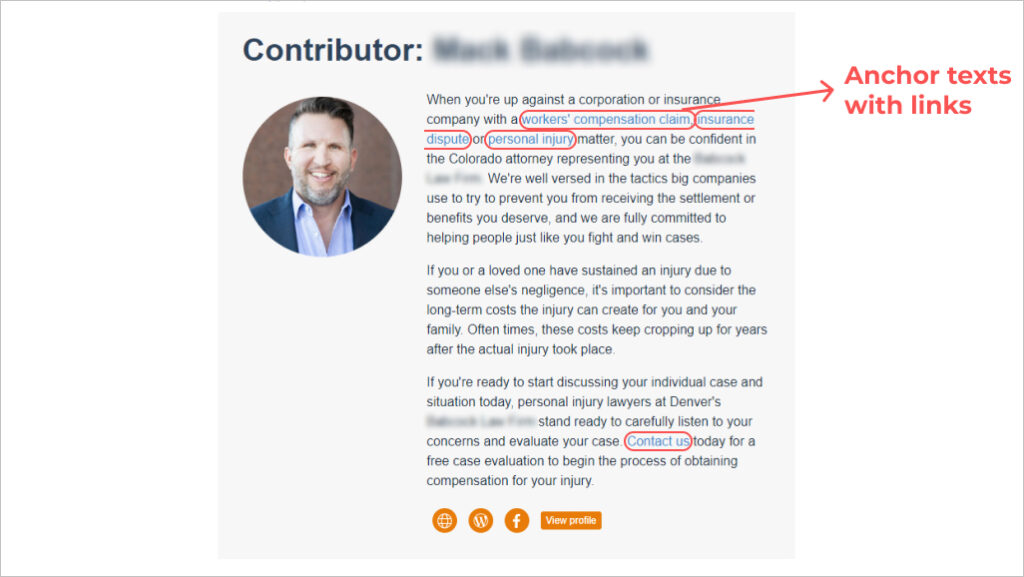
Google places significance on anchor text, as it often provides more accurate descriptions of web pages than the pages themselves. However, it’s important to note that while you have control over the anchor text for outbound links, this isn’t the case for inbound links. Altering the anchor text of a backlink can prove challenging if your rapport with the linking website isn’t robust.
Link Velocity
Link velocity refers to the rate at which a website acquires new backlinks over a given period. It is essential to maintain a natural link building profile, gradually acquiring links instead of sudden spikes. This approach helps to establish credibility and avoid penalties from search engines.
PageRank
PageRank serves as Google’s tool, assessing web page significance by weighing both backlink quantity and quality. This algorithm wields substantial influence over search result rankings.
Domain Authority
Domain Authority (DA) is a metric developed by Moz that predicts a website’s ability to rank in search engine results. It’s calculated based on various factors, including the number and quality of backlinks pointing to the website.
Domain Rating
Domain Rating (DR) is a metric developed by Ahrefs that assesses the overall strength of a website’s backlink profile. It provides an estimation of a website’s authority and influence in search engine rankings. Ahrefs, a leading SEO software developer, rates the strength of domains on a scale of 0 to 100, and for law firms, achieving a domain rating of 30-50 indicates satisfactory performance.
“Black Hat” Link Building
Black hat link-building encompasses unethical strategies that flout search engine rules, including link purchasing, involvement in link farms, and reliance on automated tools. These actions can trigger severe consequences and should be sidestepped for a trustworthy online reputation.
Link Building for Lawyers: Quantity vs. Quality
When it comes to enhancing your law firm’s online presence through link building, the age-old debate of quality versus quantity comes into play. Sure, having a million backlinks might sound impressive, but the real question is: are they actually helping your attorney’s website? Striking the right balance between quantity and quality is key. But how many backlinks are enough for lawyer websites?
It’s tempting to dive into a backlink frenzy, but not all links hold the same value. Instead of focusing solely on the numbers game, aim for authoritative and relevant backlinks that truly add value to your legal website. A handful of high-quality backlinks from trusted sources can have a more significant impact on your search engine rankings and credibility than a heap of low-quality ones.
Here are some good examples of reliable and quality websites:
- Legal industry directories with a solid reputation.
- Reputable legal blogs or online magazines.
- Government websites or educational institutions discussing legal topics.
- Well-regarded local business directories.
- Professional associations and organizations related to the legal field.
Remember, it’s not about plastering your links everywhere, but strategically placing them where they genuinely matter. Prioritizing quality over quantity in your law firm’s link-building strategy can help establish your website as an authoritative resource in the legal landscape.
Is Buying Links Worth it?
Acquiring links, or paid link building, involves procuring backlinks from external websites to bolster search rankings and enhance online visibility. Despite its allure for swift link accumulation, this strategy is widely regarded as unethical and perilous in the SEO realm.
Prominent search engines, such as Google and Bing, explicitly discourage link transactions, flagging them as guideline breaches. The repercussions of engaging in paid link-building can be severe, encompassing penalties and substantial search rank declines.
Redirecting the focus from purchased links to organic link-building tactics is recommended. Prioritizing valuable content, fostering inter-website relationships, and naturally earning backlinks prove more ethical and sustainable. These methods enhance website authority, ensuring long-term SEO prosperity.
Although buying links may yield fleeting benefits, the associated hazards and penalties outweigh its appeal. Investing energy in legitimate link-building strategies centered on quality, relevance, and organic growth is a wiser path to navigate.

Final Thoughts on Link Building for Law Firms
In the ever-evolving digital landscape, link building remains a crucial component of a successful online presence for lawyers. By following the strategies outlined in this guide, you can elevate your website’s authority, attract valuable traffic, and enhance your overall visibility in search engine results. Remember, link building requires patience, dedication, and a comprehensive approach.
Should you seek to elevate your law firm’s digital footprint to acquire more lawyer leads and grow your revenue, trust the expertise of Comrade Digital Marketing’s SEO services. Reach out today, and together, we’ll craft a robust bedrock of premium links that your practice merits.

